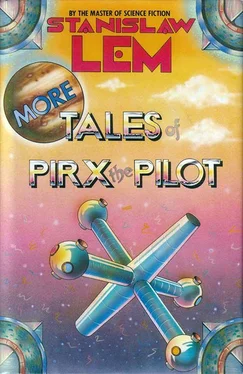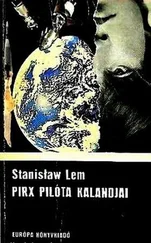He woke early, and for some reason his first thought was: The wind has died down. Then he remembered Aniel and, with some discomfort, his fantastic visions of the night before, on the borderline of sleep. He lay there a good while before coming to the somewhat reassuring conclusion that they had not been conscious fantasies, even though, unlike in a dream, they must have had some encouragement, however little and unwilled, from him. But why was he sweating such psychological subtleties? He raised himself up on his elbow and listened: dead silence. He slid back the shutter of the little port beside his head, saw through the cloudy pane a pale dawn on the rise, and knew at once that he would be going up the mountain. He bolted out of bed to double-check the common room. No robot.
The others were already up. Over breakfast, as if the matter were already settled, Krull said it was time to get a move on, that the Ampère was due in before nightfall and they would need an hour and a half, minimum, for breaking camp. He neglected to say why the urgency, whether it was the missing data or the absent Aniel.
Pirx ate enough to make up for the night before and said nothing the whole meal. The others were still working on their coffee when he got up and, after rummaging in his duffel bag, took out a spool of white nylon, a hammer, and a few pitons; on second thought, he made room in his backpack for his climbing boots—just in case.
They went out into the still-unlit dawn. The sky was drained of stars, colorless. A heavy violet-gray, stagnant and bone-bracing, hugged ground, faces, air; the mountains to the north were a black mass, solidified in murk; the southern ridge, the one closest to them, its peaks brushed with a swatch of strident orange, stood silhouetted like a molded mask with blurred, runny features. The distant, unreal glare caught the plumes of breath billowing from their mouths—despite the thinner atmosphere, breathing was easy. They pulled up on the plateau’s outer rim as the stunted vegetation, dingy-brown in the halflight between retreating night and advancing day, yielded to a barren landscape. Before them stretched a rock-littered moraine that shimmered as if under water. A few hundred meters higher, a wind blew up, bracing them with its brisk gusts. They climbed, clearing with ease the smaller boulders, scaling the larger ones, occasionally to the sound of one rock slab nudging against another, of a piece of detritus, dislodged by a boot, cascading down with a rippling echo. The intermittent squeak of a shoulder strap or a metal fitting lent their expedition a certain esprit de corps, the professional air of a mountaineering party. Pirx went second, behind Massena. It was still too dark to discern the outline of the far walls; time and again, with his attention entirely at the mercy of his straining eyes, his absent-mindedly placed foot slipped, as if he was intent on distracting himself, not only from the terrain, but also from himself, from his qualms. Shutting out all thought of Aniel, he immersed his concentration in this land of eternal rock, of perfect indifference, which only man’s imagination had invested with horror and the thrill of adventure.
It was a planet with sharply defined seasons. Hardly had they landed at the tail end of summer when an alpine autumn, lush with reds and golds, began fading in the valleys. Yet even though leaves were borne on the foam of rushing streams, the sun was still warm—on cloudless days, even sweltering—on the tableland. Only the thickening fog signaled the approach of snow and frost. But by then the planet would be deserted, and to Pirx the prospect of that consummate wasteland cast in white suddenly seemed desirable beyond all else.
The brightening, so gradual as to be imperceptible, with every step brought a new detail of the landscape into prominence. The sky had taken on that pallor between night and day—dawnless, stark, hushed, as if hermetically sealed in a sphere of cooling glass. A little farther up, they passed through a fog bank, its wispy strands clinging to the ground, and after they emerged Pirx saw their destination, still untouched by sunlight but now at least whitened by the dawn: a rock-ribbed buttress that reached up to the main ridge, up to where, a few hundred meters higher, its twin peak, the most prominent, loomed blackly. At one point the rib flared out into a troughlike basin; in this saddle Aniel had conducted his last survey.
It was a straightforward ascent and descent—no surprises, no crevasses, nothing but gray scree dappled with chick-yellow mildew. As he trod nimbly from one clattering rock pile to another, Pirx fixed on the black wall leaning against the sky and, perhaps to distract himself, imagined he was making an ordinary ascent Earthside. Suddenly these crags seemed quite natural to him, the illusion of a conquest in the making rendered even more compelling by their vertical climb toward the notched spine heaving up out of the scree. The buttress ran one-third of the way up the face before disintegrating in a riot of wedged slabs, whence a sheer rock face shot straight up like a flight arrested. A hundred meters higher, the face was cleaved by a vein of diabase—red-tinted, brighter than granite—that bulged above the surface and snaked across the flank, like a trail of varying width.
Pirx’s eyes were held in thrall by the summit’s sublime outline, though as they climbed higher, and, as was usual with a mountain viewed from below, it receded farther, and the abrupt foreshortenings broke it up into a series of overlapping planes, the base lost its former flatness, and columns sprang up—a wealth of faults, shelves, aimlessly winding chimneys, a chaos of old fissures, an anarchy of cluttered accretion, momentarily illumined by the top now gilded by the sun’s first rays, fixed and strangely placid, then once more swallowed by shadow. Pirx could not tear his eyes from it, from this colossus that even on Earth would have commanded respect, challenging the climber with that rudely jutting vein of diabase. The stretch from there to the gold-plated summit looked short and easy compared with the overhangs, especially the largest of them, whose lower edge glistened with ice or moisture, reddish-black, like congealed blood.
Pirx let his imagination run wild, conjuring up not the cliff of some anonymous highland under a foreign sun, but a mountain surrounded by a lore of assaults and reverses, somehow distinct, unique, like a familiar face whose every wrinkle and scar contained a history of its own. Its sinewy, snakelike cracks on the border of visibility, its dark, threadlike ledges, its shallow grooves might have constituted the highest point achieved in a series of attempts, the sites of prolonged bivouacs, of silent reckonings, of momentous assaults and humiliating defeats, disasters sustained even though every variety of tactical and technical gimmick was applied. A mountain so bound up with the fate of man that every climber vanquished by it came back again and again, always with the same store of faith and hope in victory, bringing to each successive pass a new fixed route with which to storm the petrified relief. It could have been a wall with a history of detours, flanking movements, each with its own chronicle of successes and victims, documented by photos bearing the dotted lines of trails, little x ’s marking the highest ascent… Pirx summoned this fantasy with the greatest of ease, actually astonished that it was not the real thing.
Massena walked ahead of him, slightly stooped, in a light whose growing limpidity annulled all illusion of an easy ascent, this illusion of easy access and safe passage having been fostered by the bluish haze that had peacefully engulfed every fragment of the glimmering cliff. The day, raw and full, had caught up with them; their shadows, exaggeratedly large, rolled and pitched under the ridge of the alluvial cone. The talus was fed by two couloirs, brimming with night, and the detritus ran straight up before being consumed by unrelieved black.
Читать дальше












